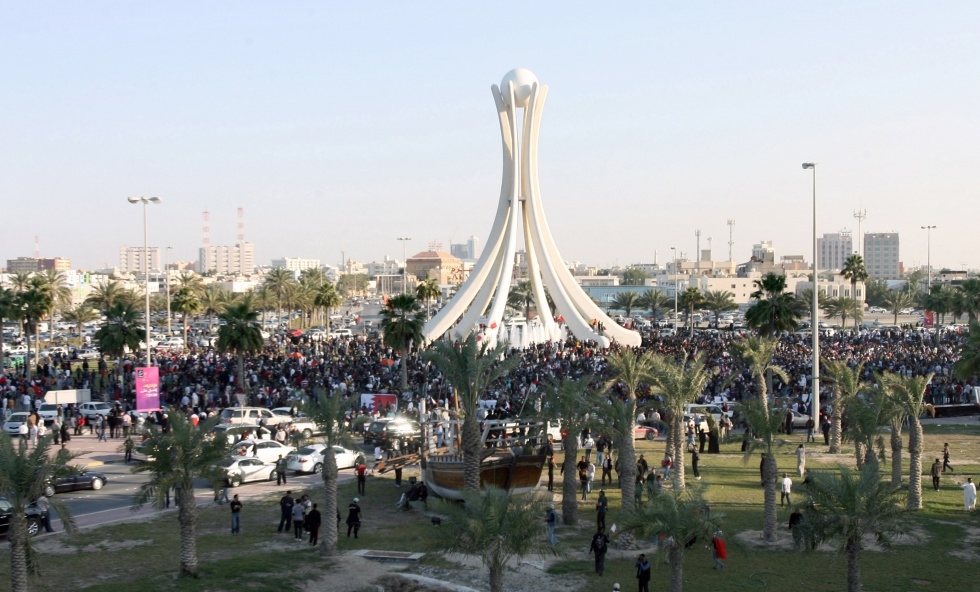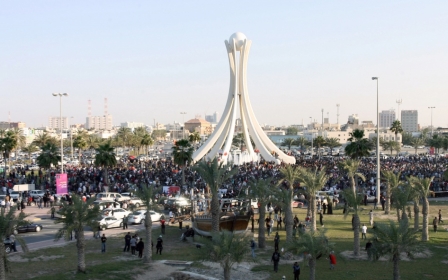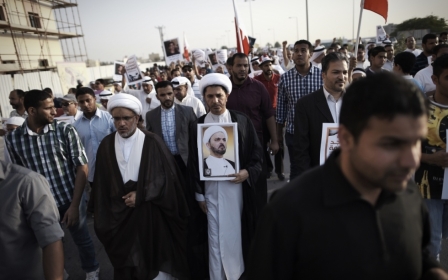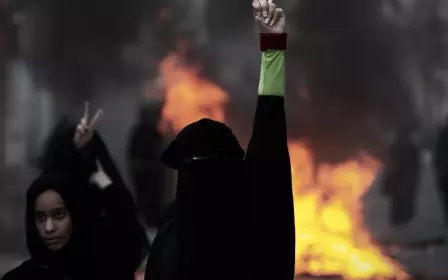Bahrain's King visits the UK amid human rights criticism

The King of Bahrain has spent three days in the UK to attend the Royal Windsor Horse Show, prompting protests and media criticism of his country’s human rights record.
King Hamad bin Issa al-Khalifa arrived in London on Friday, as British royal Prince Andrew pulled out of hosting a promotional event for Bahrain after several media reports questioned his role in supporting the monarchy there.
Hours before the prince was scheduled to open "This is Bahrain!", royal officials announced that his schedule had been double-booked and he was unable to attend.
Meanwhile King Hamad travelled to the Royal Horse Show in Windsor where he watched his son, Prince Nasser bin Hamad al-Khalifa, win the prestigious 120km endurance race. Nasser’s victory comes just days after news that he could lose his diplomatic immunity in the UK and face prosecution over his alleged involvement in the torture of Bahraini protesters, an accusation the prince strongly denies.
Friday’s event in London was organised by the Bahrain Federation of Expatriate Associations (BFEA), which was an all-day conference with stalls and speeches by members of different religious communities from Bahrain. It went ahead without its keynote speaker Prince Andrew, with organisers saying it was a chance to challenge media criticism of the monarchy by displaying the country’s religious freedom.
“We organised this event because untrue media reports have damaged the country’s reputation and impacted on the economy, which affects both Bahrainis and expatriates,” said Betsy Mathieson, secretary-general of the BFEA.
“We are here to show the truth, to correct the media reports, and show that this is the real Bahrain,” she added.
Bahrain has been in the grip of an uprising against the monarchy for three years that began in the capital Manama on 14 February 2011 when hundreds of thousands of people gathered at the Pearl Roundabout to call for democracy. Three days later, government forces broke up protest camps with teargas, birdshot and batons that left at least two dead and hundreds injured. Since then, daily protests have led to at least 89 people being killed and thousands imprisoned, according to the International Federation of Human Rights.
Violence has recently begun to play a role in the protest movement, with the use of Molotov cocktails and improvised explosive devices sporadically being used by some protesters. At least 13 police officers have been killed, with the most recent attack in March when three policemen died in an explosion west of the capital Manama.
Increasing incidents of violence have been accompanied by a rise of sectarian rhetoric and division, with the government accusing Iran of being behind the protest movement and experts saying authorities have been guilty of abusing the rights of a Shia community who make up 60 percent of the island’s 600,000 citizens.
Five Bahrainis were arrested in January accused of travelling to Iran to receive training in carrying out “terrorist attacks” by the Iranian Revolutionary Guard Corps and a month later a US State Department report said Tehran had been attempting to supply weapons to Bahrain’s opposition.
"On December 29, 2013, the Bahraini Coast Guard interdicted a speedboat filled with weapons and explosives that was likely bound for Shia oppositionists in Bahrain, specifically the 14 February Youth Coalition (14 FYC)," stated the report. Iran denies supplying weapons to the Bahraini opposition movement.
A former senior diplomat at the British embassy in Bahrain, now retired, has called into question the likelihood that Iran is exercising influence over the opposition.
“The accusations of an Iranian plot to takeover Bahrain are far-fetched, as most Bahraini Shia look to Iraq for spiritual leadership rather than to Iran,” said the official, who asked to remain anonymous as they retain close ties to Bahrain.
Experts say authorities have sectarianized the discourse around the uprising because they feared a unified opposition.
Toby Matthiesen, author of Sectarian Gulf: Bahrain, Saudi Arabia and the Arab Spring That Wasn’t, was in Manama during the early days of the protests in 2011 and says there were many unifying slogans such as “no Sunni, no Shia, just Bahraini”. Matthiesen says the government moved swiftly to “prevent a cross-sectarian opposition front”, an accusation that has led to questions being raised about restrictions on religious freedom in Bahrain.
The BFEA event held in London on Friday sought to answer these questions by bringing together the country’s Jewish, Buddhist, Hindu and Christian communities who all extolled the freedom of religion in Bahrain.
“There are countries in the Middle East where our presence would not be tolerated, so for the thousand Buddhists in Bahrain there is freedom to practice our religion,” said a Buddhist delegate, who was supplying information about his religion and asked to remain anonymous.
There was a Shia stand at the event, which was manned by a Sunni delegate when MEE visited it, although organisers insisted there were many representatives from the Shia community present. The former British diplomat at the Manama embassy has expressed concern that the religious freedom enjoyed by some is not applied to the majority Shia community.
“There is little doubt Bahrain has been a religiously tolerant place, but this has not been extended to the Shia who make up 60 percent of the population,” said the unnamed diplomat.
During the uprising in 2011, Bahraini authorities demolished 38 Shia mosques, which caused uproar in the community leading to protests that killed dozens of protesters and left thousands in prison. According to a government report, 10 of the demolished mosques have been rebuilt, while a further 17 are under construction.
Outside the conference centre near London's Westminster, a group of protesters gathered to highlight the use of torture and tear gas by security forces in Bahrain. Protesters laid out mock tear gas canisters, donned gas masks and lay on the ground to demonstrate the damaging effects of its use at protests.
Authorities have tortured detainees by using electric shocks; beating on the soles of feet; sleep deprivation; and threats of sexual abuse according to the Bahrain Independent Commission of Inquiry (BICI), which was established by the Bahraini government in June 2011 to look into how the government had responded to the protests.
Human rights activists say the use of torture has continued unabated since the BICI report, something a number of delegates inside the conference centre denied.
One was Peter Sincock, chair of the Bahrain Society, an organisation that promotes close ties between the UK and Bahrain, who said “there is no systematic torture in Bahrain”.
This battle of narratives is something that is replicated among the expatriate community itself, with the BFEA showing a united front in defending the government, but a scattering of former Bahraini residents say they were thrown out of the country for raising concerns about human rights abuses.
The BFEA, which was set up in 2012, claims to be independent, but has been accused by the retired FCO official of taking government money to host the event in London.
“The idea that a group of expats could hire the Queen Elizabeth II Conference Centre, which costs thousands of pounds per day, is a complete joke,” the now retired official said.
“The BFEA only came on the scene after the Arab Spring and it was clearly set up by the Bahraini Ministry of Information,” he added.
Secretary-general Mathieson denies this, saying they have received “donations” from businesses and taken “absolutely no government money”.
Although Mathieson says there is an open environment for expats to criticise the government, others say this isn’t the case. Expats who worked in Bahrain’s education sector say they were witness to human rights abuses and argue the vast majority of expats live in a bubble outside these problems.
“Educationalist expats exposed to Bahraini students could see first-hand the abuses taking place against protesters – students would be arrested and then turn up to class a few days later with obvious injuries,” said Mike Dibbol, former staff member at the both the University of Bahrain and the Bahrain Teacher’s College, who says he was forced to leave the country due to his criticism of human rights abuses.
“99 percent of expats live in areas that are insulated from the protests and never see, let alone speak to, the people affected by the human rights abuses taking place,” he added.
Dibbol says authorities withhold a portion of salary payments from expat workers in order to secure their loyalty and ensure they remain silent about any alleged human rights abuses.
“It is standard for expat contracts to include one month’s salary per year being withheld to be paid at the end of the employment term, which functions as a loyalty bonus,” he said. “If you speak out about abuses then this payment is promptly taken away from you and this tends to ensure silent complicity from expats who are in Bahrain to earn a tax free salary."
Dibbol, who says he raised concerns about human rights abuses in private meetings with work colleagues, was denied this payment when he was forced to leave Bahrain in May 2011. A letter sent by the University of Bahrain and seen by the Middle East Eye says he violated the terms of his contract because of “activities on social media”, which Dibbol says constituted raising concerns about violence against protesters.
Tony Mitchell, who worked as a teacher at the Bahrain Polytechnic until June 2011, filmed security services attacking protestors and his footage was used by media outlets across the world.
“I was woken up at 3am when security forces moved to clear protestors from the Pearl Roundabout and managed to film some of what happened,” Mitchell said. “Hundreds of security forces were there, tear gas was everywhere and I heard constant loud bangs, so I filmed what I was seeing and uploaded it to YouTube like anyone else would”.
After his footage was broadcast by providers including the BBC, Mitchell attracted attention from his students, some of whom praised him while others tried to convince him what he had seen was a distortion of reality.
“I began to get Facebook messages from students I never met or taught, who were trying to get me to admit the videos I recorded were untrue and convince me the protesters had weapons that were being used to injure police officers,” he said. “When students kept pressing me on saying the protestors had guns and explosives, I would say they were wrong. I was there and they were not armed."
It was after this that Mitchell was called to see the CEO of the polytechnic, who told him he had 30 days to leave Bahrain.
“The students kept a record of everything I wrote in reply to them and eventually I was called in front of the CEO to be told the Ministry of Education didn’t want me to work there anymore,” he said. “No reasons were given, but they had copies of the Facebook conversations I had with students as ‘evidence’”.
A feeling of being monitored helped contribute to a culture of fear among staff, lead to 60 leaving in the summer of 2011, according to another former employee at the polytechnic.
“Everyone was terrified about mentioning the violence," said former teacher, Jan Ryan. "We went through ceilings looking for microphones because we knew authorities were monitoring us and had the software to monitor what we said online."
Ryan left Bahrain after making a submission to the government commissioned BICI report about attacks on protesters she had witnessed, saying she believed that if she had not voluntarily left then she would have been deported.
“I saw people being beaten up. We had guns pointed at our heads by security forces, so I was compelled to make a submission to give my perspective,” she said. “Everyone assumed if you made a submission, the government would find out and you would be marched out of the country."
The BFEA’s Mathieusen denies there is a culture of fear in the country.
“We have this wonderful multicultural society, which is totally open and free," she said in response to allegations of abuse against protesters and restrictions placed on expat workers.
Bahraini rights activists slammed Mathieusen and the event in London as being part of a public relations strategy to mitigate reputational damage done to the government over the past three years.
“The Bahraini monarchy has spent in excess of $50 million on public relations firms like Bell Pottinger to whitewash the regime’s image, however, serious allegations of torture have ensured public relations events such as these have completely backfired,” said Ala’a Shehabi, founding member of monitoring group Bahrain Watch.
As the Royal Horse Show in Windsor closed on Sunday evening it brought to an end three days of criticism and protests that revealed the deeply held divisions in Bahrain to which no solution appears close. National dialogue talks between the government and opposition groups have been suspended since January and there are few signs that they will restart anytime soon, seemingly leaving this tiny Gulf Island deadlocked for the foreseeable future.
Middle East Eye propose une couverture et une analyse indépendantes et incomparables du Moyen-Orient, de l’Afrique du Nord et d’autres régions du monde. Pour en savoir plus sur la reprise de ce contenu et les frais qui s’appliquent, veuillez remplir ce formulaire [en anglais]. Pour en savoir plus sur MEE, cliquez ici [en anglais].





